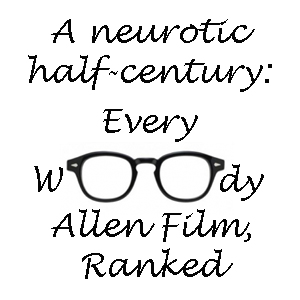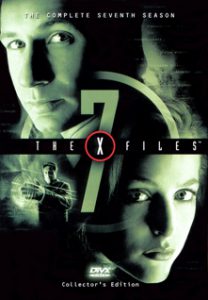I remembered “The X-Files” Season 7 (1999-2000, Fox) as being a tired, going-through-the-motions year where David Duchovny wanted it all to end. I wasn’t exactly right. Certainly, this is the weakest season of “The X-Files” up to this point, but separated from the news reports of whether Duchovny or the show itself would come back for an eighth season, it’s clear that this is still a professional, high-quality show.
Going through the checklist
There are several misfires in this season, but it’s not because no one cared; it’s because they tried to do too much. I imagine a checklist in “The X-Files” offices: Man with super good luck? Check. Genie? Check. A magician episode? Check. Bring back Donnie Pfaster? Check. Resolve this thing with Mulder’s sister? Check.
But many episodes got made without everyone understanding what the tone should be. In too many episodes, I wondered, “Am I supposed to be taking this seriously?”

“The X-Files” Season 7 (1999-2000)
Fox, 22 episodes
Showrunner: Chris Carter
Starring: David Duchovny, Gillian Anderson, Mitch Pileggi
The “X-Files” team intended to have fun in Season 7; unfortunately, the fun transfers to the viewer only about half the time. In Season 6, by comparison, I was totally onboard for the whole ride.
Mythology sputters
The most undeniable weakness of Season 7, though, is that the mythology sputters and runs out of gas. The mythology episodes noticeably lack the tension and gravity of previous years, and frankly, there just aren’t as many of them — only the season-opening two-parter and the finale are concerned with the current narrative. (The Samantha Mulder two-parter is about tying up loose ends).
I’ve criticized some mythology episodes in the past, but to be honest, I really missed them in Season 7. Good or bad, they have always given “The X-Files” a sense of momentum and importance.
On the positive side, Season 7 introduces us to a fourth type of “X-Files” episode (following monster-of-the-week, mythology and Darin Morgan-style comedy): the character piece. And it’s actually two first-time writer-directors, actors Gillian Anderson and William B. Davis, who deliver the year’s two best episodes: “all things,” featuring Scully, and “En Ami,” featuring the Cigarette-Smoking Man.
Characters are the saving grace of Season 7: Sure, the quality is uneven, but the series never loses sight of who it’s characters are, what they stand for, and why we love them.
Here are my rankings of the 22 episodes:
1. “all things” (episode 17, written by Gillian Anderson)
It’s been said that no one understands a character better than the actor who plays them, and Anderson’s writing and directing debut is a case in point. She shows a knack for a thoughtful, independent-film approach to storytelling (note the scenes of Scully walking down the street as music plays).
“all things” starts off memorably with Scully waking up at Mulder’s place (no, it’s not what you think, but still …) and then flashes back to Scully reflecting on a life that could have been if she had settled down with her former professor in med school. In the bittersweet conclusion, she realizes she is where she wants to be, partnering with Mulder at the FBI.

2. “En Ami” (15, William B. Davis)
Davis explores the CSM as he takes Scully on a quest to acquire the alien cure for all human ailments. Understandably, Scully is wary — secretly tape-recording everything — but this is also a sympathetic portrayal of a lonely, ailing old man. He’s not to be trusted, obviously, but I don’t know if we can label him as pure evil, either. I’m still wondering about that ending, where the CSM tosses the disc with the cure into the lake.
3. “Requiem” (22, Chris Carter)
Even when the dying CSM attempts to strike a deal with the rebel aliens and start a new conspiracy, it seems like he’s going through the motions. Also, I’m glad they’re back, but: How did Covarrubias survive her black-oil infection and why was Krycek in a Tunisian prison? Did I sleep through an episode somewhere along the way?
Still, it’s nice to have the mythology jump-started as “Requiem” ends with four key developments: 1, Mulder is abducted by the rebel aliens; 2, Skinner sees the alien craft; 3, Krycek and Covarrubias kill the CSM by pushing him down a flight of stairs; and 4, Scully is inexplicably pregnant.
4. “Hungry” (3, Vince Gilligan)
This is a standard MOTW except that it’s told from the perspective of the monster, who is quite sympathetic as he tries to control his hunger for human brains and Mulder knows what’s going on the whole time. Weirdly, but not offensively, it has a comedic vibe — there’s that scene where the landlady’s body is dumped into the garbage truck in the background, and I laugh every time the kid’s stomach grumbles.
5. “Chimera” (16, David Amann)
I like the effect of the mirror shattering every time the raven-monster’s reflection hits it. It’s also amusing how Mulder is staying at a beautiful home with caring hosts while Scully is stuck on a scummy stakeout.
6. “Theef” (14, Gilligan, John Shiban and Frank Spotnitz)
Great performances — the creepy illiterate villain and the doctor who would go on to play Bill Buchanan on “24” — gives this MOTW extra emotional punch.
7. “Brand X” (18, Greg Walker and Steven Maeda)
It’s awesome to see “The X-Files” finally take on one of the scariest real-world villains: Powerful tobacco companies. And as a nicotine addict, Tobin Bell gives a soft-spoken, disturbing performance that might’ve earned him his star-making turn in the “Saw” franchise.
8. “The Amazing Maleeni” (8, Gilligan, Shiban and Spotnitz)
“The X-Files” tries its hand at a pulpy mystery, and the exploration of the world of magic is fun, even if we’re left with more questions than answers.
9. “Orison” (7, Chip Johannessen)
Considering that this marks the return of Nick Chinlund’s Donnie Pfaster, the fan-favorite villain (all too human, although he might actually be the Devil incarnate) from Season 2’s “Irresistible,” it’s too bad that the final act is almost identical: He traps Scully in her home. Still, it sets up the daring conclusion where Scully kills him in cold blood — and feels she did the right thing.
10. “The Goldberg Variation” (6, Jeffrey Bell)
In one if this season’s many experimental “What if” episodes, we meet a guy who has nothing but good luck — but he’s miserable because his good fortune corresponds with bad breaks for other people.
11. “Hollywood A.D.” (19, David Duchovny)
A notable step down from Duchovny’s previous writing-directing effort, Season 6’s “The Unnatural,” this comedy about a filmmaker following Mulder and Scully as research for his movie (starring Gary Shandling as Mulder and Tea Leoni as Scully) doesn’t land its punchlines, which are too obvious (Would Leoni go for a guy like Mulder?) or too strange (Shandling wonders if Mulder dresses to the left or to the right, which I’m guessing is a callback to a “Larry Sanders Show” joke).
It has a poignant moment, though, as Mulder watches “Plan 9 from Outer Space” for the 42nd time and Scully says, “Doesn’t that make you sad, Mulder? It makes me sad.”
12. “Rush” (5, Amann)
As a sucker for any horror story set in high school, I remembered loving “Rush,” which has sort of a “Buffy” vibe. It’s a decent concept, as a cave with alien powers serves as a metaphor for drug addiction, but the actor playing the villainous kid goes for camp value and it throws off the tone of the episode.
13 and 14. “Sein Und Zeit” (10, Carter and Spotnitz)/“Closure” (11, Carter and Spotnitz)
If I’m understanding “Closure” correctly, Mulder’s sister was first abducted by aliens, then briefly raised by the CSM, then abducted from the CSM by a human kidnapper, who also took the girl featured in “Sein Und Zeit,” whose family is now ignored in “Closure” so Mulder cry over Samantha and gain closure. (In retrospect, “Sein Und Zeit” is a completely superfluous episode, and I’m ranking it here only for the sake of keeping this two-parter together.) At any rate, we’re done with the Samantha thread, and I’m glad.
15 and 16. “The Sixth Extinction” (1, Carter)/“The Sixth Extinction II: Amor Fati” (2, Carter and Duchovny)
Mulder, whose mind is sped up after he comes in contact with an alien artifact, might be the key providing a successful antidote against the coming alien virus. Not a bad plotline on paper, but this season-opener (continuing from Season 6’s “Biogenesis”) can’t generate the momentum of earlier seasons’ mythology.
Mulder being laid out on a crucifix-shaped operating table is over the top, and the off-screen dispatching of Mimi Rogers’ Agent Fowley — who, for reasons never adequately explained, sided with the CSM — is a case of the writers dumping a character they had no more use for.
17. “Je Souhaite” (21, Gilligan)
Another “What if” entry gives Mulder three wishes from a genie. The ending is solid (Mulder wishes to free the genie), but first we have to wade through 40 minutes of humor-tinged prelude where two morons misuse their wishes and Scully is fascinated by an invisible body.
18. “First Person Shooter” (13, William Gibson and Tom Maddox)
The second William Gibson/Tom Maddox entry is a big step down from Season 5’s outstanding “Kill Switch.” The concept of a video game character coming to life isn’t terrible (although it makes no logical sense), but in the end, we’re just watching Mulder and Scully play a video game, and I’m still not sure if it was supposed to be funny or deadly serious. I don’t think Anderson or Duchovny knew, either.
19. “Millennium” (4, Gilligan and Spotnitz)
At the end of this zombie-themed episode, Frank Black (Lance Henrickson) from “Millennium” — which was canceled the year before — is reunited with his daughter and gets to break his broodiness with a smile. I haven’t watched the other Chris Carter series (I intend to rectify that someday, as the first two of the three seasons are apparently outstanding), but I’ve read that Henrickson wasn’t thrilled with this episode, and I agree that it isn’t great.
20. “X-Cops” (12, Gilligan)
An “X-Files” episode shot in the style of “Cops.” It’s executed well — complete with boom at the top of the frame — but I got the joke right away and then kind of wished I were watching the story in “The X-Files” style again.
21. “Fight Club” (20, Carter)
The tone suggests this is supposed to be a comedy — people start fighting each other whenever twins played by Kathy Griffin enter the same room — but I just wasn’t laughing.
22. “Signs and Wonders” (9, Bell)
This failure highlights something “The X-Files” normally does so well: It avoids repeating itself. But this is a familiar “crazy religious people who might be onto something” yarn, and the final twist, although surprising, isn’t earned. Also, some gross-outs are fun, but some are just gross, and a woman giving birth to snakes falls into the latter category.
What were your favorite episodes from Season 7? Is it the worst season of “The X-Files” up to this point, or am I underrating it? Share your thoughts below.

